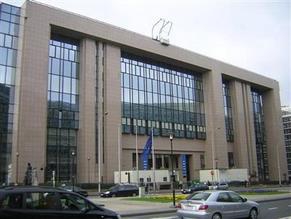|
World Jewish News

The EU Council building in Brussels.
|
EU Conclusions on the Middle East Peace Process
15.12.2010, Israel and the World "1. The EU believes that urgent progress is needed towards a two state solution to the Israeli-Palestinian conflict. We want to see the State of Israel and a sovereign, independent, democratic, contiguous and viable State of Palestine living side by side in peace and security. The legitimacy of the State of Israel and the right of Palestinians to achieve statehood must never be called into question.
2. The EU notes with regret that Israel has not extended the moratorium as requested by the EU, the US and the Quartet. Our views on settlements, including in East Jerusalem, are clear: they are illegal under international law and an obstacle to peace. We reiterate our views on the status of Jerusalem and repeat our call for all parties to refrain from provocative unilateral actions and violence.
3. The EU affirms its readiness to contribute to a negotiated solution on all final status issues within the 12 months set by the Quartet. To this end, the EU will continue to work closely with the parties and reaffirms its support to the US efforts in order to bring the parties back to the negotiating table. The EU stresses the importance of intensified coordination within the Quartet as well as of close cooperation with Arab partners, building on the Arab Peace Initiative. The EU underlines the urgency of finding a negotiated solution and urges the parties to refrain from actions that undermine the prospects of peace. The EU remains committed to contribute substantially to post-conflict arrangements.
4. Council Conclusions of December 2009 set out the EU’s views on the key parameters, principles and issues. We reiterate those Conclusions. The EU will not recognize any changes to the pre-1967 borders, including with regard to Jerusalem, other than those agreed by the parties. This could include agreed territorial swaps. A way must be found through negotiations to resolve the status of Jerusalem as the future capital of two states. The EU calls for an agreed, just, fair and realistic solution to the refugee question. A negotiated settlement must allow the two States to live side by side in peace and security.
5. The EU commends the work of the Palestinian Authority in building the institutions of the future State of Palestine and reiterates its full support for their endeavours in this regard and the Fayyad plan. Recalling the Berlin Declaration, the Council reiterates its readiness, when appropriate, to recognize a Palestinian state. We welcome the World Bank’s assessment that “if the Palestinian Authority maintains its current performance in institution building and delivery of public services, it is well positioned for the establishment of a State at any point in the near future”. The EU remains ready to develop further its bilateral relations with Israel within the framework defined at the Association Council of June 2009 and by its conclusions of December 2009. Within the framework of these conclusions, the EU is also ready to develop further its bilateral relations with the Palestinian Authority.
6. The EU recalls that peace in the Middle East should be comprehensive and reiterates the importance of negotiations on the Israel-Syria and Israel-Lebanon tracks. Peace should lead to the full integration of Israel in its regional environment, along the lines set out in the Arab Peace Initiative.
7. Recalling the Council Conclusions of June 2010, the EU remains extremely concerned by the prevailing situation in Gaza. The EU reiterates its call for the immediate, sustained and unconditional opening of crossings for the flow of humanitarian aid, commercial goods and persons to and from Gaza. Despite some progress following the decision of the Israeli government of 20 June 2010 to ease the closure, changes on the ground have been limited and insufficient so far. Further efforts and complementary measures are needed to achieve a fundamental change of policy that allows for the reconstruction and economic recovery of Gaza as well as improve the daily lives of the population while addressing Israel's legitimate security concerns. The Council calls on those holding the abducted Israeli soldier Gilad Shalit to release him without delay. The Council calls for a complete stop of rocket attacks at Israel and all other forms of violence.
8. Palestinian exports are an essential component of Gaza’s recovery. In this respect, the EU welcomes the recent announcement by the Israeli government concerning new measures to facilitate exports out of Gaza. We encourage a swift implementation by Israel and are ready to work with Israel towards achieving pre-2007 levels of exports in 2011 to produce real change on the ground. Increased and accelerated imports of construction materials are another crucial component of Gaza's recovery and also for building schools and health centres.
9. The EU recalls its readiness to assist in the reconstruction and economic recovery of Gaza in close partnership with the Palestinian Authority and the Israeli government, in line with UNSC Resolution 1860 and on the basis of the 2005 Agreement on Movement and Access. As parts of a comprehensive EU approach, including CSDP missions, the EU is ready to extend its support to improvements to the crossings infrastructure, to purchase and install the necessary equipment and also to train Palestinian border and crossings management personnel to operate the crossings."
EJP
|
|
